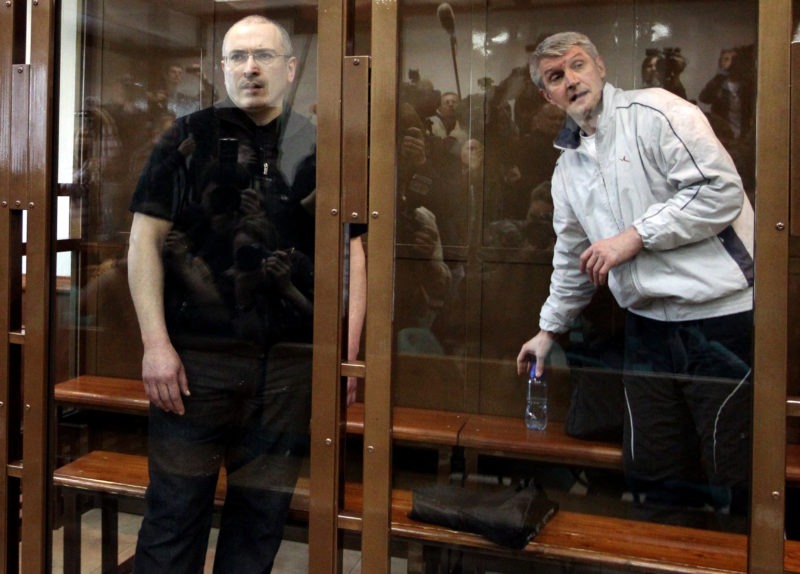Dutch court set to rule in $50bn Yukos appeal
Khodorkovsky, left, and his business partner Platon Lebedev, right, both spent a decade in jail for corruption. Putin unexpectedly pardoned Khodorkovsky in 2013 (Alexey SAZONOV)
Moscow (AFP) – A Dutch appeals court is set to hand down a landmark ruling Tuesday in a complex case involving defunct Russian oil giant Yukos whose former shareholders are claiming $50 billion in damages.
The long-awaited ruling comes almost 14 years after the once powerful company filed for bankruptcy and follows a controversial 2014 ruling that Russia must pay out billions of dollars in compensation to its former shareholders.
The international Permanent Court of Arbitration (PCA) in The Hague that year ruled that Russia had forced Yukos into bankruptcy with excessive tax claims and then sold off its assets to state-owned companies.
It ordered Moscow to pay more than $50 billion to the former shareholders — a record award for the arbitration tribunal.
– Shock turnaround –
But in a shock turnaround a local Dutch court in 2016 annulled the PCA’s decision, saying it was “not competent” to rule in the case.
Shareholders then appealed against this ruling, with the verdict expected Tuesday.
But Tuesday’s decision may not be the end of the saga: the parties may still fight the decision at the Dutch Supreme Court, officials said.
Yukos, once Russia’s biggest post-Soviet oil company, was broken up after its former owner, Kremlin critic and ex-tycoon Mikhail Khodorkovsky, was arrested in 2003.
His arrest came after Russian President Vladimir Putin had warned the nation’s growing class of oligarchs against meddling in politics.
Yukos was sold off in opaque auctions to state companies led by Rosneft between 2004 and 2006. State-owned Rosneft was then small, but has since become a leading player among the world’s biggest listed oil companies by production volume.
The claimants have since sought to win compensation for what they say are their losses caused by the break-up of Yukos.
– ‘Not political’ –
The PCA based its ruling on the Energy Charter Treaty, which protects international investments in energy projects.
However, Dutch judges said that although Moscow signed the charter it had not ratified it, and that the PCA’s decisions were “contrary to Russian law”.
Another question “relates to the circumstances of the Yukos takeover by the Russian oligarchs during its privatisation in 1995 and 1996,” Russian government lawyer Andrea Pinna told AFP.
As the former Soviet Union crumbled in the early 1990s, unscrupulous businessmen amassed immense fortunes and influential empires by scooping up former Soviet assets — particularly in raw materials — at bargain-basement prices.
“Russia considers that the acquisition of Yukos was only possible through corruption and other illegal acts,” Pinna said.
This was “not a political case but purely a legal one in which $50 billion is at stake,” the lawyer insisted.
But Emmanuel Gaillard, representing former shareholders, told AFP that “Russia is making considerable diplomatic efforts to try and discredit the players in this case.”
“Their strategy is to distort everything, to complicate everything, to make people forget about the greatest expropriation of the 21st century,” Gaillard said.
Khodorkovsky, who is no longer a stakeholder, spent a decade in prison on charges of tax evasion, fraud and embezzlement which he and his supporters say were trumped up in revenge for his political ambitions.
He was suddenly pardoned by Putin in 2013 and flown out of the country.
His business partner Platon Lebedev spent more than 10 years in jail for fraud, tax evasion and money laundering after a trial denounced by human rights activists.
Disclaimer: Validity of the above story is for 7 Days from original date of publishing. Source: AFP.


